489
Why small fridges make cities better
A well thought kitchen design in modern eco houses affects our consumer habits. How much space should occupy the fridge at home?
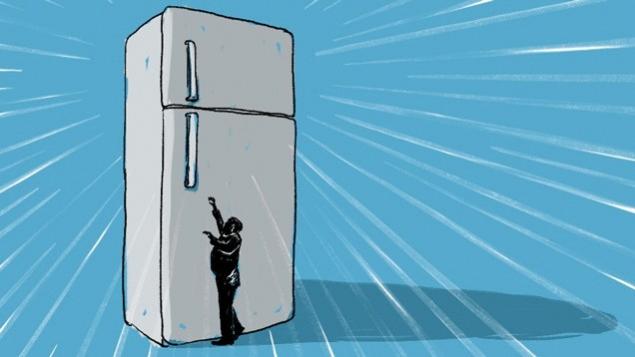
According to designer Donald Chong small fridges make the city better — the people who have little space in the fridge more often eat fresh seasonal produce, buy as much as they need, take more products into local markets from local producers than in supermarkets.
In Europe is becoming increasingly popular to shop every day.
According to modern designers, we need to go back to traditional ways of storing food, in order to make it more useful.
As noted by Kris De Decker, "We have transferred the responsibility of care for our food the refrigerator and freezer. We don't see more food and we don't understand how to treat it."
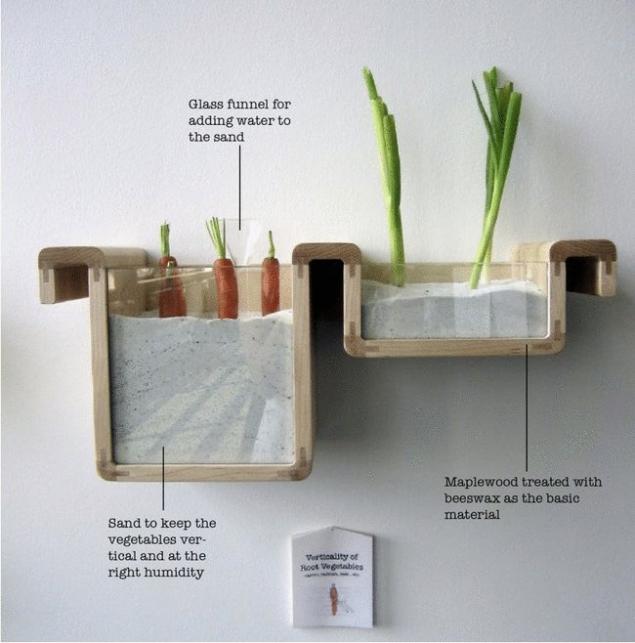
Chris explains the real benefits of preserving food in the refrigerator:
The more food you can keep out of the refrigerator, the less it needs to be and the less energy it will consume. We should use the ways to refresh the products and to remember that this is art, not consumer goods. The use of methods of storing food in the basement or a specially designed cellar — the traditional way — and it will give the best results.
Today most fridges are filled with groceries, which lie there forever, and probably they taste much better if they will never be forgotten in the back of the fridge. Our refrigerators resemble expensive air conditioners from the Parking lot.
Modern consumer trend is that refrigerators be more. They adapt to the way people graze instead of eating. The modern consumer opens the refrigerator an average of 50 times a day. And the latest development of refrigerators, if not encourage, then support this unhealthy habit of fattening.
It became already clear that the little refrigerator will not only make the city greener, they make people healthy.
A small refrigerator against больших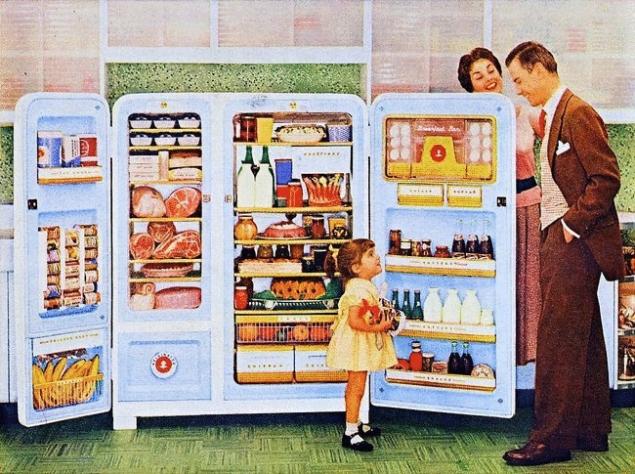
While this battle is lost. Large refrigerators in the kitchen it's a lifestyle, a cultural product. Studies show that:
Thanks to the efficiency of modern cold chain, almost everyone can now afford to eat foods out of season, or of all kinds of products shipped from afar.
More cooling food = more global warming
The modern cold chain is a huge burden of energy. It includes the supply of refrigerated shipping containers, trucks, warehouses and vast banks of fridges in supermarkets."
Now the fridge has all chances to become a formidable new factor in climate change; cooling is already responsible for 15% of the total consumption of electricity in the world, and leaks of chemical refrigerants are a major source of pollution and greenhouse gas emissions. Any changes in lifestyle that threaten the planet right now, the storage product is as important as their consumption.
We are rapidly losing the skills of pickling, fermentation, salting and canning food, but in America, for example, these skills have long been lost.
Your Giant American Refrigerator is making you weak and жирными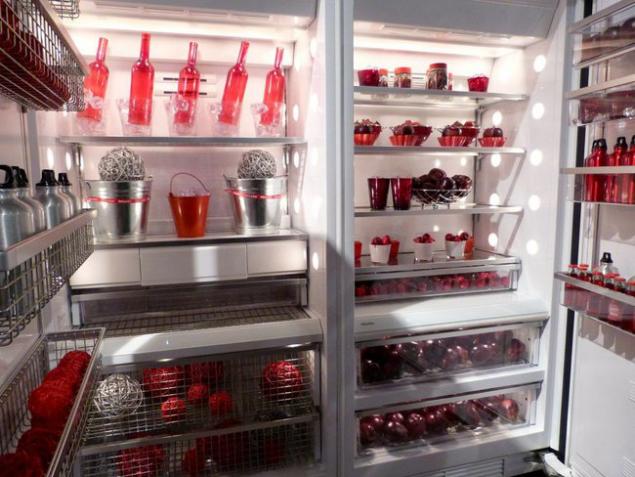
Recently, Dan Nosowitz wrote an article about the problems of large refrigerators, and how they encourage bad eating habits.
Large refrigerators are encouraging unhealthy eating. Brian Wansink, Professor of nutritional science and consumer behavior, conducted a study of the buyers club, which showed that families that have more food in the house eat more food. If your freezer is large enough to accommodate a family SUV and it's full of ice cream because you bought it wholesale at a discount, then you're subconsciously going to eat more of this ice cream than if you just bought one pack for your freezer reasonable size.
He notes that it is necessary to acquire a small fridge. They use less electricity to operate, take up less space in the kitchen and "less is almost always cheaper than more, but it becomes more challenging. Since the store is trying to sell us always more, for less."
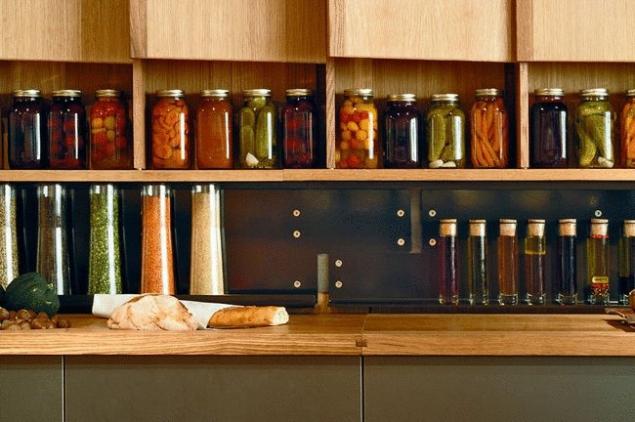
We should return to the tradition of home canning instead of freezing, use small refrigerators and buy seasonal, local products. But everything points to the fact that worldwide consumption is in the other direction.
Source: rodovid.me

According to designer Donald Chong small fridges make the city better — the people who have little space in the fridge more often eat fresh seasonal produce, buy as much as they need, take more products into local markets from local producers than in supermarkets.
In Europe is becoming increasingly popular to shop every day.
According to modern designers, we need to go back to traditional ways of storing food, in order to make it more useful.
As noted by Kris De Decker, "We have transferred the responsibility of care for our food the refrigerator and freezer. We don't see more food and we don't understand how to treat it."

Chris explains the real benefits of preserving food in the refrigerator:
The more food you can keep out of the refrigerator, the less it needs to be and the less energy it will consume. We should use the ways to refresh the products and to remember that this is art, not consumer goods. The use of methods of storing food in the basement or a specially designed cellar — the traditional way — and it will give the best results.
Today most fridges are filled with groceries, which lie there forever, and probably they taste much better if they will never be forgotten in the back of the fridge. Our refrigerators resemble expensive air conditioners from the Parking lot.
Modern consumer trend is that refrigerators be more. They adapt to the way people graze instead of eating. The modern consumer opens the refrigerator an average of 50 times a day. And the latest development of refrigerators, if not encourage, then support this unhealthy habit of fattening.
It became already clear that the little refrigerator will not only make the city greener, they make people healthy.
A small refrigerator against больших

While this battle is lost. Large refrigerators in the kitchen it's a lifestyle, a cultural product. Studies show that:
Thanks to the efficiency of modern cold chain, almost everyone can now afford to eat foods out of season, or of all kinds of products shipped from afar.
More cooling food = more global warming
The modern cold chain is a huge burden of energy. It includes the supply of refrigerated shipping containers, trucks, warehouses and vast banks of fridges in supermarkets."
Now the fridge has all chances to become a formidable new factor in climate change; cooling is already responsible for 15% of the total consumption of electricity in the world, and leaks of chemical refrigerants are a major source of pollution and greenhouse gas emissions. Any changes in lifestyle that threaten the planet right now, the storage product is as important as their consumption.
We are rapidly losing the skills of pickling, fermentation, salting and canning food, but in America, for example, these skills have long been lost.
Your Giant American Refrigerator is making you weak and жирными

Recently, Dan Nosowitz wrote an article about the problems of large refrigerators, and how they encourage bad eating habits.
Large refrigerators are encouraging unhealthy eating. Brian Wansink, Professor of nutritional science and consumer behavior, conducted a study of the buyers club, which showed that families that have more food in the house eat more food. If your freezer is large enough to accommodate a family SUV and it's full of ice cream because you bought it wholesale at a discount, then you're subconsciously going to eat more of this ice cream than if you just bought one pack for your freezer reasonable size.
He notes that it is necessary to acquire a small fridge. They use less electricity to operate, take up less space in the kitchen and "less is almost always cheaper than more, but it becomes more challenging. Since the store is trying to sell us always more, for less."

We should return to the tradition of home canning instead of freezing, use small refrigerators and buy seasonal, local products. But everything points to the fact that worldwide consumption is in the other direction.
Source: rodovid.me























